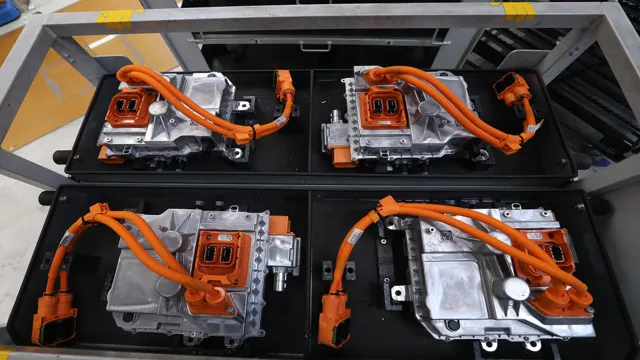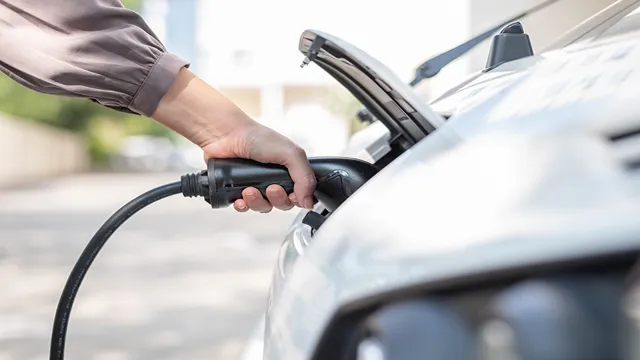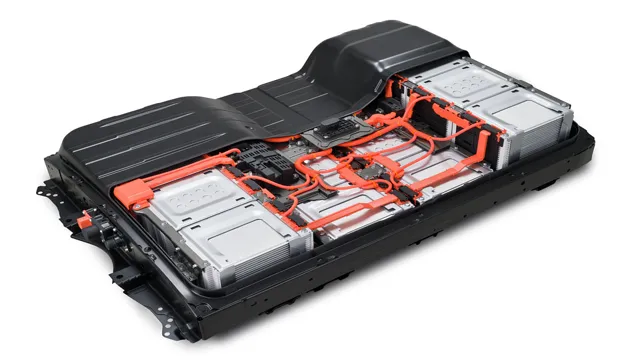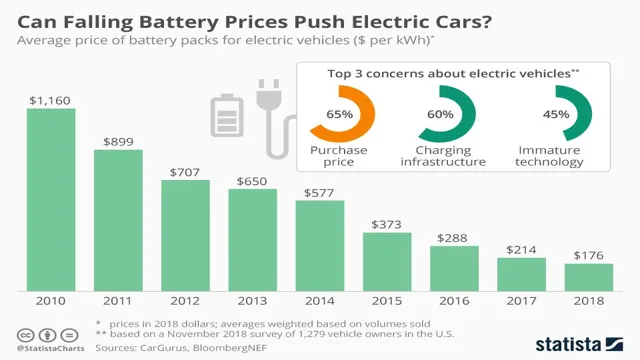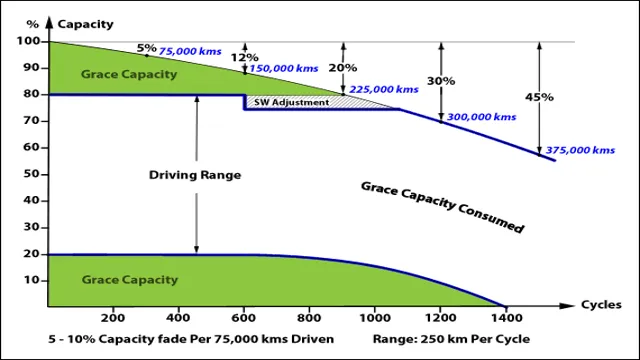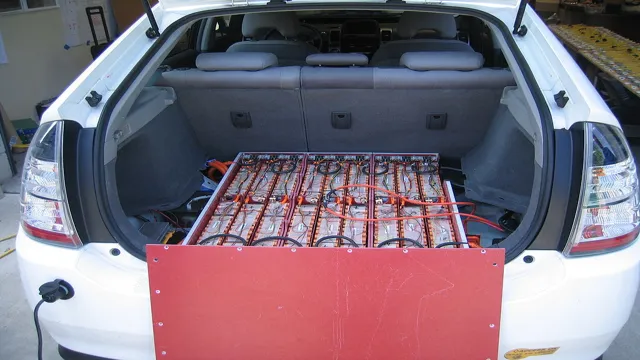Revive Your Electric Ride: The Ultimate Guide to Battery Replacement for Electric Cars
Electric cars have taken the world by storm, with their sleek design, low environmental impact, and impressive range capabilities. However, like any other car, their batteries can die out, leaving you in a precarious situation. Fortunately, there is no need to fret.
There is a solution that will save you the cost of buying a new car: replacing the electric car battery. While the cost of replacing an electric car battery varies depending on the specific make and model, it is generally much cheaper than buying a new car. Not only that, but battery technology has developed significantly recently, with newer models boasting longer-lasting batteries.
In this blog, we will explore the benefits of replacing your electric car’s battery, how much it can cost, and the best time to do so. We will also look into what you can do to prolong the life of your battery, including proper maintenance and charging methods. So, whether you are a seasoned electric car owner or are considering making the switch, keep reading to learn all you need to know about replacing your electric car battery.
Why Replace Your Battery?
Battery replacement for electric cars is an important part of maintenance that owners need to consider. Electric cars rely heavily on battery power and the quality of the battery can greatly affect the vehicle’s performance. Over time, batteries lose their ability to hold a charge and will eventually need to be replaced.
A car with a deteriorating battery will not only have reduced range, but it can also affect the ability of the car to accelerate and perform other functions. This is why it is important to regularly monitor the battery’s condition and consider battery replacement when necessary. Investing in a high-quality replacement battery may seem expensive, but it can ultimately save you money in the long run by improving the efficiency of your electric car and preventing potential damage that can arise from a weak battery.
So if you start to notice a decline in your vehicle’s performance or range, it may be time to consider a battery replacement for your electric car.
Decreased Range and Performance
As electric vehicles become increasingly common, it’s important to be aware of the effects that aging batteries can have on their performance. One of the most noticeable effects is a decreased range, which can be a major inconvenience for drivers who rely on their EVs for daily commuting or long trips. When an electric car’s battery begins to wear down, it may not hold as much charge as it did when it was new, causing the vehicle’s range to be significantly reduced.
Additionally, a degraded battery can lead to a reduction in overall performance, such as slower acceleration and a less responsive motor. To avoid these issues, it’s important to replace the battery in your electric vehicle when it begins to show signs of wear and tear. By doing so, you’ll be able to enjoy the full range and performance of your EV for years to come.

Risk of Fire or Other Issues
When you hear about the risk of fire or other issues with your battery, it’s easy to brush it off as something that won’t happen to you. But the truth is, any battery has the potential to fail and cause serious problems if it’s not replaced when necessary. The risk of fire is especially high with old or damaged batteries, as they can become unstable and overheat.
This is why it’s so important to replace your battery before it gets to this point. Not only will it give you peace of mind knowing that you’re not putting yourself or others in danger, but it will also ensure that your device is working as efficiently as possible. So don’t wait until it’s too late – protect yourself and your devices by replacing your battery when needed.
When to Replace Your Battery?
When it comes to owning an electric car, one of the most important things to keep an eye on is the battery life. After all, the battery is what powers your vehicle and keeps it running smoothly. But how do you know when it’s time to replace the battery? There are a few signs to watch out for, such as a decrease in driving range, slower charging times, and a loss of overall performance.
If you notice any of these issues, it’s likely that your battery is starting to lose its effectiveness and may need to be replaced. It’s also a good idea to get your battery checked by a professional every few years, just to make sure it’s still in good working condition. By staying on top of your battery’s health and replacing it when needed, you can help ensure that your electric car stays running smoothly and efficiently for years to come.
Age and Mileage of Your Vehicle
As your vehicle ages and racks up mileage, it’s important to pay attention to the health of your battery. A car battery is typically designed to last for about three to five years, depending on its usage and the conditions it’s exposed to. However, if you’re driving an older vehicle, your battery may need to be replaced sooner.
As a general rule of thumb, if your battery is over three years old and you’ve noticed it’s starting to struggle to turn over your engine, it may be time to get a new one. Similarly, if your car has been sitting unused for an extended period of time and the battery is over three years old, it’s a good idea to have it checked out to ensure it’s still functioning properly. Ultimately, the age and mileage of your vehicle are important factors to consider when deciding when to replace your battery.
By staying on top of your vehicle’s maintenance needs, you can help ensure it operates reliably for years to come.
Diagnostic Tests and Warning Signs
As a vehicle owner, one of the most important maintenance tasks you need to be aware of is when to replace your battery. Your car battery plays a vital role in powering all the electrical parts of your vehicle. However, like all parts, it has a lifespan, and you need to replace it before it dies completely.
But when should you replace it? There are several warning signs and diagnostic tests to look out for. One of the most common warning signs is when your car struggles to start. If you notice your headlights dimming when you start your car, or if it takes longer to turn over, it could be an indication that your battery is about to fail.
Another sign is when your battery warning light appears on your dashboard. In general, it’s best to replace your car battery every 3-5 years, depending on its usage and the climate. You can also use a diagnostic test to check your battery’s voltage and the charging system’s output.
By keeping an eye out for these warning signs and scheduling regular maintenance checks, you can ensure that your vehicle is always running smoothly on the road.
Battery Replacement Options
Are you in the market for a battery replacement for your electric car? There are a few options to consider when it comes to getting a fresh battery for your vehicle. One option is to go to your car manufacturer, as they will have the exact specifications for the battery your car needs. Another option is to look at aftermarket batteries, which may be more cost effective.
However, it’s important to make sure the aftermarket battery is compatible with your car and meets all safety regulations. You can also choose to rent a battery rather than buying one outright, which can save you money in the short term but may end up costing more in the long run. Whatever option you choose, make sure to do your research and find the best fit for your car and your budget.
Don’t let a dead battery drag you down – there are plenty of options out there to get your electric car back on the road.
OEM vs Aftermarket Batteries
When it comes to replacing a battery in your device, you may find yourself torn between an OEM battery and an aftermarket one. OEM stands for original equipment manufacturer, which means the battery is made by the same company that made your device. Aftermarket batteries, on the other hand, are made by third-party manufacturers.
While OEM batteries may seem like the obvious choice, they can be more expensive than aftermarket batteries. Plus, aftermarket batteries can often provide the same level of performance as OEM batteries at a lower cost. However, it’s important to be cautious when purchasing an aftermarket battery, as quality can vary greatly between manufacturers.
It’s always a good idea to do your research and read reviews before making a purchase. Ultimately, the decision between OEM and aftermarket batteries will depend on your budget and needs.
Professional Installation vs DIY
When it comes to replacing your car battery, you may be wondering if you should opt for professional installation or tackle it as a DIY project. There are benefits to both options, depending on your level of expertise and comfort with automotive repairs. If you’re confident in your ability to safely remove and install a battery, a DIY approach may be cost-effective and convenient.
However, if you’re unsure of the process or lack the necessary tools, it’s best to let the professionals handle it. Not only does professional installation ensure the battery is installed correctly, but it also often comes with a warranty for added peace of mind. Ultimately, it’s up to you to determine which option is best for your specific situation and needs.
Regardless of which route you choose, be sure to dispose of your old battery properly and recycle it at a designated facility. Doing so not only benefits the environment but also helps ensure the safe disposal of potentially hazardous materials.
Benefits of a New Battery
Are you considering a battery replacement for your electric car? It may seem like a big investment, but the benefits can be significant. First and foremost, a new battery can greatly improve the range and performance of your vehicle. Over time, older batteries may lose their ability to hold a charge, which can limit how far you can travel on a single charge.
By upgrading to a new battery, you can increase your range while also enjoying faster acceleration and a smoother ride. Additionally, a new battery can help extend the lifespan of your electric car. By replacing a worn-out battery, you can extend the overall lifespan of your vehicle and avoid costly repairs in the future.
Plus, the latest battery technologies are often more efficient, which can save you money on your energy bills. So if you’re on the fence about a battery replacement, it may be worth considering the long-term benefits that come with investing in a new battery.
Improved Performance and Range
Switching to a new battery technology can bring several benefits to your electric vehicle. One of the most significant advantages is improved performance and range. The new batteries offer higher energy density, which means they can store more energy in the same amount of space as the old batteries.
This increased energy storage capacity leads to better range and longer drive times before needing to recharge. Additionally, the new batteries can deliver more power to the electric motor, resulting in faster acceleration and better overall performance. With these improvements, electric vehicles can now travel longer distances and compete with traditional gas-powered cars in terms of performance.
Making the switch to a new battery technology not only benefits your wallet, but it also benefits the environment as well. By reducing the reliance on fossil fuels and moving towards more sustainable energy sources, we can help reduce our carbon footprint and create a cleaner, more prosperous future.
Peace of Mind and Safety
When it comes to your vehicle’s battery, installing a new one can provide a range of benefits that allow for greater peace of mind and safety on the road. A fresh battery ensures that your vehicle starts consistently and reliably, avoiding the stress and inconvenience of a dead battery. Additionally, a new battery can help power your vehicle’s electronics and safety features, such as anti-lock brakes and airbags, providing an added layer of protection while driving.
By investing in a new battery, you can also avoid the risk of a sudden breakdown or failure, especially during extreme weather conditions. Ultimately, the peace of mind and added safety that a new battery provides is well worth the investment, allowing you to focus on the road ahead without worrying about unexpected battery issues.
Conclusion
Replacing the battery in an electric car is like giving it a new lease on life. Just like we need our morning coffee to power through the day, an electric car needs a fully charged battery to get going. So, when your car’s battery starts showing signs of wear and tear, don’t hesitate to give it the upgraded replacement it deserves.
Not only will it give your car a new spark, but it will also keep you cruising on the roads with maximum efficiency and minimal carbon footprint. After all, when it comes to electric cars, the battery is the heart and soul of the vehicle. So, keep it pumping with a fresh battery replacement and watch your car soar to new heights!”
FAQs
How often do I need to replace the battery on my electric car?
The lifespan of an electric car battery can vary, but most manufacturers estimate around 8-10 years before replacement is necessary.
Can I replace the battery on my electric car myself?
It is not recommended to replace the battery on your own, as it can be a complex and dangerous task. It is best to take your car to a certified professional for battery replacement.
How much does it cost to replace the battery on an electric car?
The cost of battery replacement can vary depending on the make and model of your car, as well as the type of battery. On average, you can expect to pay around $5,500 to $7,500 for battery replacement.
Is it possible to upgrade the battery on my electric car?
Yes, it is possible to upgrade the battery on some electric car models. However, it is important to do your research and consult a professional to ensure compatibility and safety. The cost of upgrading can also vary greatly depending on the make and model of your car.

